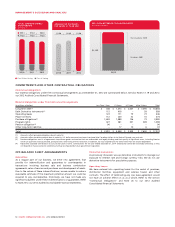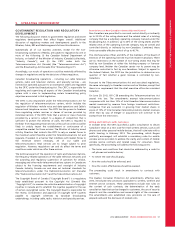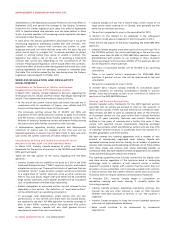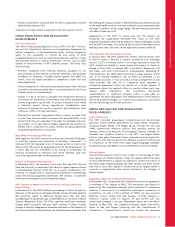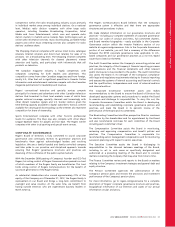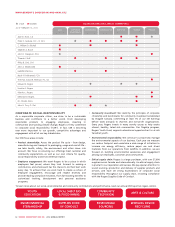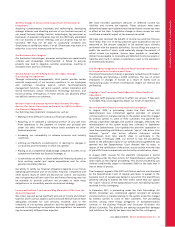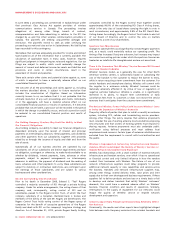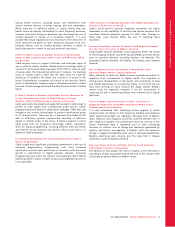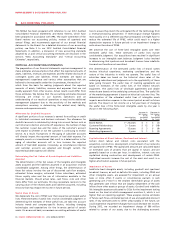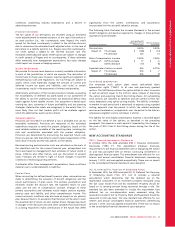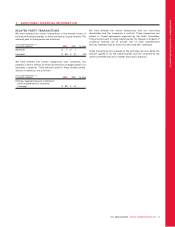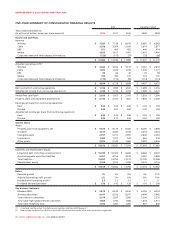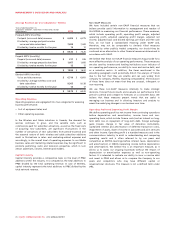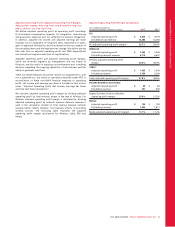Rogers 2012 Annual Report Download - page 69
Download and view the complete annual report
Please find page 69 of the 2012 Rogers annual report below. You can navigate through the pages in the report by either clicking on the pages listed below, or by using the keyword search tool below to find specific information within the annual report.
MANAGEMENT’S DISCUSSION AND ANALYSIS
We May Engage in Unsuccessful Acquisitions, Divestitures or
Investments
Acquiring complementary businesses and technologies, developing
strategic alliances and divesting portions of our business are part of
our overall business strategy. Services, technologies, key personnel or
businesses of acquired companies may not be effectively assimilated
into our business or service offerings, and our alliances may not be
successful. We may not be able to successfully complete any
divestitures on satisfactory terms, if at all. Divestitures may result in a
reduction in our total revenues and net income.
Our Businesses Are Complex
Our businesses, technologies, processes and systems are operationally
complex and increasingly interconnected. A failure to execute
properly may lead to negative customer experiences, resulting in
increased churn and loss of revenue.
We Are Reliant on Third Party Service Providers through
Outsourcing Arrangements
Through outsourcing arrangements, third parties provide certain
essential components of our business operations to our employees
and customers, including payroll, certain facilities/property
management functions, call centre support, certain installation and
service technicians, certain information technology functions, and
invoice printing. Interruptions in these services can adversely affect
our ability to service our customers.
We Have Debt and Interest Payment Requirements That May
Restrict Our Future Operations and Impair Our Ability to Meet
Our Financial Obligations
Our debt may have important consequences, such as:
• Making it more difficult to satisfy our financial obligations;
• Requiring us to dedicate a substantial portion of any cash flow
from operations to the payment of interest and principal due
under our debt, which would reduce funds available for other
business purposes;
• Increasing our vulnerability to adverse economic and industry
conditions;
• Limiting our flexibility in planning for, or reacting to, changes in
our business and the industry in which we operate;
• Placing us at a competitive disadvantage compared to some of our
competitors that have less financial leverage; or
• Constraining our ability to obtain additional financing required to
fund working capital and capital expenditures and for other
general corporate purposes.
Our ability to satisfy our financial obligations depends on our future
operating performance and on economic, financial, competitive and
other factors, many of which are beyond our control. Our business
may not generate sufficient cash flow and future financings may not
be available to provide sufficient net proceeds to meet these
obligations or to successfully execute our business strategy.
Income and Indirect Tax Amounts May Materially Differ from the
Amounts Expected
We collect, pay and accrue significant amounts of income and indirect
taxes for and to various taxation authorities and believe that we have
adequately provided for such amounts. However, due to the
complexity of our business operations and the significant judgment
required in interpreting tax legislation and regulations, tax amounts
may be materially different than expected.
We have recorded significant amounts of deferred income tax
liabilities and income tax expense. These amounts have been
determined based upon substantively enacted future income tax rates
in effect at the time. A legislative change in these income tax rates
could have a material impact on the amounts recorded.
We have also recorded the benefit of income tax positions that are
more likely than not of being sustained upon examination and are
measured at the amount expected to be realized upon ultimate
settlement with the taxation authorities. Our tax filings are subject to
audits, the results of which could materially change the amount of
actual income tax expense, income taxes payable or receivable,
indirect taxes payable or receivable and deferred income tax assets or
liabilities and could, in certain circumstances, result in the assessment
of interest and penalties.
The Changing Competitive Landscape Requires Heightened Focus
on Organizational Structure and Talent
The telecommunications industry is generally competitive with respect
to attracting and retaining a skilled workforce. The loss of certain
employees or changes in morale as a result of events such as
restructuring could, in certain circumstances, impact our revenue and
profitability.
Copyright Tariff Increases Could Adversely Affect Results of
Operations
Copyright tariff pressures continue to affect our services. If fees were
to increase, they could negatively impact our results of operations.
We Are and Will Continue to Be Involved in Litigation
In August 2004, a proceeding under the Class Actions Act
(Saskatchewan) was commenced against providers of wireless
communications in Canada relating to the system access fee charged
by wireless carriers to some of their customers. The plaintiffs are
seeking unspecified damages and punitive damages, effectively the
reimbursement of the system access fees collected. In September
2007, the Saskatchewan Court granted the plaintiffs’ application to
have the proceeding certified as a national, “opt-in” class action. As a
national, “opt-in” class action, affected customers outside
Saskatchewan must take specific steps to participate in the
proceeding. In February 2008, our motion to stay the proceeding
based on the arbitration clause in our wireless service agreements was
granted and the Saskatchewan Court directed that its order, in
respect of the certification of the action, would exclude from the class
of plaintiffs those customers who are bound by an arbitration clause.
In August 2009, counsel for the plaintiffs commenced a second
proceeding under the Class Actions Act (Saskatchewan), asserting the
same claims as the original proceeding. This second proceeding was
ordered conditionally stayed in December 2009 on the basis that it
was an abuse of process.
The Company’s appeal of the 2007 certification decision was dismissed
by the Saskatchewan Court of Appeal and leave to appeal to the
Supreme Court of Canada was denied in June 2012. The plaintiffs are
presently seeking to extend the time within which they can appeal
the “opt-in” decision of the Saskatchewan Court. No liability has been
recorded for this contingency.
In December 2011, a proceeding under the Class Proceedings Act
(British Columbia) was commenced against providers of wireless
communications in Canada relating to the system access fee charged
by wireless carriers to some of their customers. The proceeding
involves, among other things, allegations of misrepresentations
contrary to the Business Practices and Consumer Protection Act
(British Columbia). The plaintiffs are seeking unquantified damages
and restitution. No liability has been recorded for this contingency.
2012 ANNUAL REPORT ROGERS COMMUNICATIONS INC. 65



